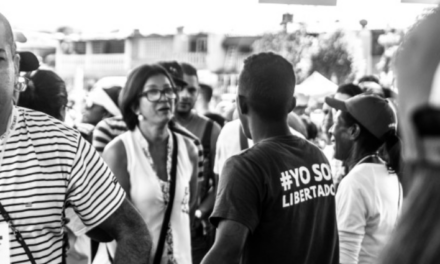Last Sunday’s symbolic vote organized by the Venezuelan opposition to reject the government’s proposed Constituent Assembly, was met with an outpouring of support from regional and European countries, who called on the administration of President Nicolas Maduro to reconsider its bid to rewrite the country’s basic document.
Among governments in the Americas, the most vocal have been members of the same group of 20 nations that have spoken out in recent weeks against the Constituent Assembly in forums like the Organization of American States (OAS). The governments of Mexico, Colombia, Peru, Brazil, Argentina, Panama, Costa Rica, and Canada all issued statements of support for the July 16 vote as evidence that Venezuela’s people oppose the Constituent Assembly.
Most of these statements also included varying endorsements of, as Mexico’s government put it, “the search for a negotiated solution that will allow for the restoration of democratic order.”
OAS Secretary General Luis Almagro, for his part, called the vote a “historic step in the exercise of democracy” in Venezuela, and described it as a reference point for the international community.
These statements were echoed by European countries. Along with statements by the governments of Germany, France, and Spain, the High Representative of the European Union for Foreign Affairs and Security Policy, Federica Mogherini, spoke to press about the vote and the situation in Venezuela more broadly.
Hinting at the possibility of the EU leveling sanctions against Venezuela, Mogherini told reporters that “[o]bviously all the options are always on the table for political consideration.” In subsequent reporting, it has become clear that there is support for at least considering such sanctions in the body, with the government of Portugal being the only clear dissenting voice against them.
The day after the vote, United States’ President Donald Trump issued a statement lamenting that the “strong and courageous actions continue to be ignored by a bad leader who dreams of becoming a dictator,” referring to Maduro. Going further, the U.S. leader promised “swift economic actions” if the Constituent Assembly proposal moves forward on July 30, a message that was echoed by State Department spokeswoman Heather Nauert.
On July 18, administration figures told members of the press that the government was preparing a new round of targeted sanctions against Venezuelan officials, which could be announced in the coming days. According to reports, those on the sanctions list would include Defense Minister Vladimir Padrino López, as well as United Socialist Party (PSUV) Vice President Diosdado Cabello.
The White House is apparently prepared to take this strategy even further, with the Wall Street Journal reporting that the administration is weighing banning Venezuelan crude-oil exports to the U.S. Reuters is reporting that the US could ban dollar payments for oil shipments.
US Senator Marco Rubio, who has for the past several years argued for the virtues of targeted sanctions on government officials on the basis of their not hurting the Venezuelan people, now says broad economic sanctions would not hurt them either. He explains: “I don’t believe the Venezuelan people are enjoying the benefits of a declining oil industry…It’s going entirely to enrich those who are tied to it, and to pay for debt obligations.”
He is receiving support in this position from Secretary General Luis Almagro, who in his testimony to a US Senate Foreign Relations Committee hearing on Venezuela suggested. “We need more economic pressure on a government that is investing the money it earns through natural resources that belong to the people to fight and kill that very same people.”
But there is widespread skepticism of economic sanctions in Venezuela and elsewhere. Venezuelan opposition lawmaker Angel Alvarado—a member of the National Assembly’s economic commission—suggested “the consequences for Venezuela would be catastrophic…it would be a collapse without precedent.”
Moises Naim—former Venezuelan Minister of Trade and Industry and a Distinguished Fellow at the Carnegie Endowment for International Peace—remarked to the WSJ that a U.S. oil embargo would be like “political manna from heaven for Caracas,” noting that it could aid Maduro’s attempts to paint his government as under siege from U.S. aggression.
Columnist Andres Oppenheimer echoed this argument, but suggested the US could condition oil purchases on the consent of the National Assembly.
WOLA analysts have likewise rejected the specter of unilateral economic sanctions. Geoff Thale argued that unilateral sanctions—targeted or broad—could raise exit costs on officials in the government, making them “feel they have no option but to resist.”
Speaking to the AFP, David Smilde noted that blanket sanctions against the oil sector could have a devastating impact on the economy, and in turn on everyday Venezuelans. “There is no way to apply economic sanctions now in Venezuela without making the humanitarian situation much worse. People will starve to death,“ argued Smilde (listen also to podcast discussion of sanctions).



